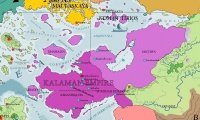Difference between revisions of "Kalama"
Trismegistus (talk | contribs) m (clarification of dates) |
Trismegistus (talk | contribs) m (history) |
||
| Line 3: | Line 3: | ||
[[File:KalamanEmpireca2500AS.jpg|thumb|200px|Extent of Kalaman Empire during the [[Surizhah Kingdom]] around 2500 AS]] | [[File:KalamanEmpireca2500AS.jpg|thumb|200px|Extent of Kalaman Empire during the [[Surizhah Kingdom]] around 2500 AS]] | ||
| − | =Cultural | + | =History= |
| + | Kalaman History is immense, reaching back to the [[Flood of Aturyanda]]. The millennia before the time of chaos which include periods before about 6100 AS is highly suspect among scholars as largely semi-legendary. Scholars consider most written history of Kalama from 6100 AS which is the beginning of the city-state period towards the present to contain many credible facts, including dynasties, rulers, and cultural history. The dynasties from this time on are grouped into five successive kingdoms, Gahashpujani, Pandhauzhi, Neibhu-Yona, Surizhah, Tamukh, and Jatha-Nebir. After the Jatha-Nebir Kingdom, there is the transitional period of the Midringir Settlement of Kalama and the end of classical Kalaman civilization. | ||
| + | |||
| + | =Cultural Legacy of Kalama= | ||
* Astronomy | * Astronomy | ||
* Architecture | * Architecture | ||
Revision as of 01:00, 26 December 2013
Kalama is the Ithatian name given in the early first century before Salmakhamer to the pre-Midretassene civilization of Corundy. The civilization according to Kalaman records began shortly after the Flood of Aturyanda and persisted with many changes and revolutions until the immigration of the Midringir Tribes, 1100 AS to 475 AS at the end of which Kalaman had ceased to exist as a distinct and sovereign civilization.

History
Kalaman History is immense, reaching back to the Flood of Aturyanda. The millennia before the time of chaos which include periods before about 6100 AS is highly suspect among scholars as largely semi-legendary. Scholars consider most written history of Kalama from 6100 AS which is the beginning of the city-state period towards the present to contain many credible facts, including dynasties, rulers, and cultural history. The dynasties from this time on are grouped into five successive kingdoms, Gahashpujani, Pandhauzhi, Neibhu-Yona, Surizhah, Tamukh, and Jatha-Nebir. After the Jatha-Nebir Kingdom, there is the transitional period of the Midringir Settlement of Kalama and the end of classical Kalaman civilization.
Cultural Legacy of Kalama
- Astronomy
- Architecture
- Civil Engineering
- Engineering
- Hirgunya Script
- Historical Records
- Kalaman Literature
- Music
- Religion
 Primary Sources
Primary Sources
- Aturyandakumi
- Jairuthalakumi, Samptarah ahwa Kamaddhu, ca 4700 AS
 Secondary Sources
Secondary Sources
See Also
- Aturyanda
- Corundy
- Flood of Aturyanda
- Jairutthalese Empire
- Kalaman Language
- Kalamantica
- Kalamantizing Philosophers
- List of Rulers and Dynasties of Kalama
| This article is a stub. It requires further development by the creator. |